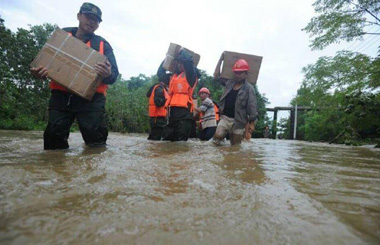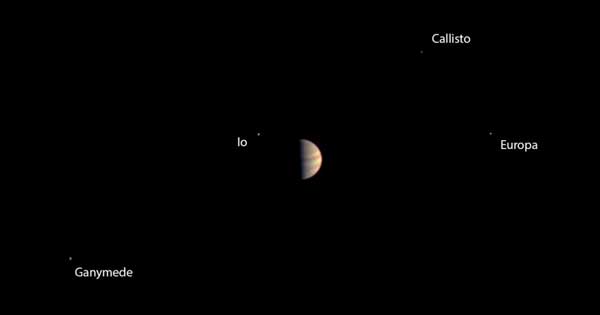NASA's Juno spacecraft loops into orbit around Jupiter
Updated: 2016-07-05 13:42
(Agencies)
|
||||||||
CAPE CANAVERAL, Fla.- NASA'S Juno spacecraft capped a five-year journey to Jupiter on Monday with a do-or-die engine burn that looped it into orbit to probe the origins of the biggest planet in the solar system and how it impacted the rise of life on Earth, the US space agency said.
Juno fired its main engine beginning at 11:18 p.m. EDT/0318 Tuesday GMT, slowing the spacecraft so it could be captured by the planet's gravity.
Launched from Florida nearly five years ago, Juno needed to be precisely positioned, ignite its main engine at exactly the right time and keep it firing for 35 minutes to become only the second spacecraft to orbit Jupiter.
If anything went even slightly awry, Juno would have sailed helplessly past Jupiter, unable to complete a $1 billion mission.
Once in position to begin its 20-month science mission, Juno will fly in egg-shaped orbits, each one lasting 14 days, to peer through the planet's thick clouds, map its gargantuan magnetic field and probe through the crushing atmosphere for evidence of a dense inner core.
The probe also will hunt for water in Jupiter's thick atmosphere, a key yardstick for figuring out how far away from the sun the gas giant formed.
Jupiter's origins, in turn, affected the development and position of the rest of the planets, including Earth and its fortuitous location conducive to the evolution of life.
Jupiter, which could hold 1,300 Earths, orbits five times farther from the sun than Earth, but it may have started out elsewhere and migrated, jostling its smaller sibling planets as it moved.
Earth and Mars were positioned at the right distance from the sun for liquid surface water, which is believed to be necessary for life. Scientists have been studying Mars to figure out why the planet lost its water.
- NASA's Juno spacecraft loops into orbit around Jupiter
- Independence Day parade held in Washington D.C.
- 'Star Wars stormtroopers' celebrate culture festival in Spain
- UKIP leader Farage announces surprise departure
- Explosion heard near US consulate general in Jeddah: media
- 43 killed in NW Pakistan flash flood

 Iceland soccer team gets hero's welcome back home
Iceland soccer team gets hero's welcome back home
 Power giant Hanergy shows its solar concept cars
Power giant Hanergy shows its solar concept cars
 Murray downs Kyrgios; Serena powers into quarters
Murray downs Kyrgios; Serena powers into quarters
 Nanjing's Linggu temple offers best view of fireflies
Nanjing's Linggu temple offers best view of fireflies
 In pics: Bikes in Beijing hutongs
In pics: Bikes in Beijing hutongs
 World in photos: June 27- July 3
World in photos: June 27- July 3
 Installation process of world's largest telescope in China
Installation process of world's largest telescope in China
 Dam's floodway blasted to discharge water in Hubei
Dam's floodway blasted to discharge water in Hubei
Most Viewed
Editor's Picks

|

|

|

|

|

|
Today's Top News
Abe's blame game reveals his policies failing to get results
Ending wildlife trafficking must be policy priority in Asia
Effects of supply-side reform take time to be seen
Chinese State Councilor Yang Jiechi to meet Kerry
Chinese stocks surge on back of MSCI rumors
Liang avoids jail in shooting death
China's finance minister addresses ratings downgrade
Duke alumni visit Chinese Embassy
US Weekly

|

|








